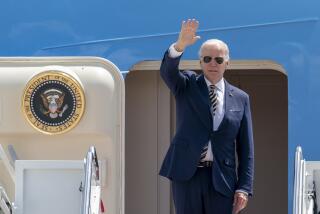Peace Is the Prime Factor in South Asia’s Complicated Equation
- Share via
For too long, American apathy toward the causes of oppressed Muslims around the world has been at the root of a growing vacuum in U.S. foreign policy. Religiously motivated extremism, terrorism and the development of weapons of mass destruction have filled the gaping vacuum created from Bosnia to Chechnya to Kashmir.
On Sunday, President Clinton began visits to India, Bangladesh and Pakistan--collectively home to one-third of the world’s 1.1 billion Muslims--to start the process of reversing these dangerous trends. In India, Clinton seeks to lay the foundation for more than $300 billion in capital investments set to flow into Indian power and telecommunications sectors while emphasizing the value of its 200 million middle-class consumers for American goods and its vibrant, high-technology sector that exports world-class software.
In Pakistan, Clinton seeks to prevent the country’s implosion at the hands of extremist elements whose anti-Western rhetoric has infected a new generation of Pakistanis and whose jihadist agenda threatens his trade and investment proposals with India. To succeed, he will have to be careful that an empty-handed visit punctuated by assertive lectures on democracy and nuclear nonproliferation don’t further exacerbate extremist pressures that are largely a result of Washington’s decade-long abandonment of Pakistan.
The economic revitalization of India and the secular revival of Pakistan will not happen if New Delhi and Washington insist on putting business priorities above regional peace and security. This means putting the unfinished business of Kashmir on the agenda, along with discussions about how to pump natural gas to Calcutta or package software in Bangalore.
Clinton also must avoid falling prey to his hosts’ tendencies to create optical illusions. He must deliver in New Delhi a strong message that the international community will not accept India’s proposal for a Kashmir solution. India is pushing a militarily oriented clamp-and-hold strategy, regardless of the humanitarian costs, because it believes that Pakistan is a failing state that can neither sustain military support for internal resistance nor mobilize world opinion on a brokered solution.
Pakistan, from which much of the current extremist threat emanates, is faced with reconstructing civil society under the guidance of generals whose mentors ushered in the era of extremism and non-indigenous resistance in Kashmir. Without at least an offer from India of earnest dialogue on Kashmir, Clinton will have little leverage to prevent the complete radicalization of Pakistan. He might remind the Indians that devolving political power to Pakistan’s people, as its military junta has promised, is equivalent to handing the country over to a more controllable generation of illiterate citizens whose vulnerability to the Muslim clerics can only lead Pakistan toward an irretrievably extremist Islamic “democracy.”
The task of reconstructing dialogue with Pakistan is complicated by Islamabad’s high-pressure military strategy on Kashmir, in which a wide array of destabilization tactics are employed to raise the specter of a wider conflict without actually going so far as to provoke war. The central objective: to ensnare Western powers into mediating a final Kashmiri solution.
Clinton knows a solution on Kashmir is not possible in the current environment of distrust. The Pakistanis know this as well. Yet the visit could seek to create the conditions in which both sides take steps to lessen the risk for an otherwise inevitable full-scale war. In Islamabad, he should ask the generals to stop giving non-indigenous insurgents arms and munitions and artillery screens to Kashmiri militants. In return, Clinton will have to lean hard on New Delhi to change the comportment of its troops in Kashmir. Their appalling record of human rights abuses--beatings, rapes and murders--is a dark blemish on India’s claim as a civilized democracy. Clinton also should explain to his Indian hosts that dialogue and reconciliation must begin if army coups are to become a remnant of Pakistan’s troubled past.
Pakistan’s army is the only institution that can sell peace to a skeptical and disillusioned public and make it stick. Stabilizing Kashmir would reduce the need for bloated defense budgets and give future civilian Pakistani governments much-needed breathing room to resuscitate a bankrupt economy rather than cower in the shadows of generals eager to flex their muscles.
Clinton has an unprecedented opportunity to introduce the concept of economic self-reliance and peaceful coexistence to a region that has known little more than militaristic intimidation, corruption and despotism. Let us hope he takes advantage of it.
More to Read
Sign up for Essential California
The most important California stories and recommendations in your inbox every morning.
You may occasionally receive promotional content from the Los Angeles Times.













